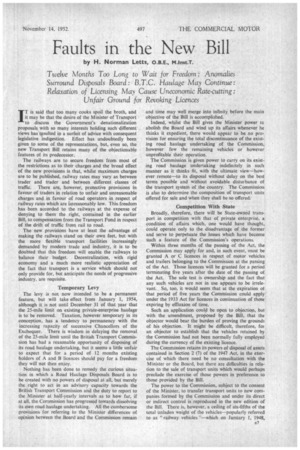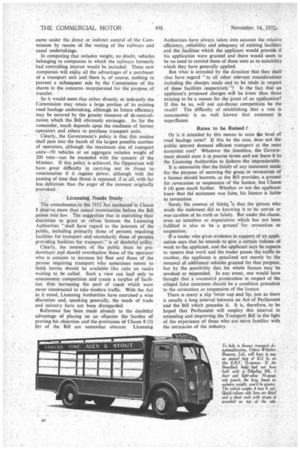Faults in the New Bill • by H. Norman Letts, 0.8.E., M.Inst.T.
Page 41

Page 42

If you've noticed an error in this article please click here to report it so we can fix it.
Twelve Months Too Long to Wait for Freedom : Anomalies Surround Disposals Board: B.T.C. Haulage May Continue: Relaxation of Licensing May Cause Uneconomic Rate-cutting: Unfair Ground for Revoking Licences
IT is said that too many cooks spoil the broth, and it may be that the desire of the Minister of Transport to discuss the Government's denationalization proposals with so many interests holding such different views has resulted in a surfeit of advice with consequent
legislative indigestion. Effect has undoubtedly been given to some of the representations, but, even so, the new Transport Bill retains many of the objectionable features of its predecessor.
The railways are to secure freedom from most of the restrictions as to their charges and the broad effect of the new provisions is that, whilst maximum charges are to be published, railway rates may vary as between trader and trader and between different classes of traffic. There are, however, protective provisions in favour of traders in relation to unfair and unreasonable charges and in favour of road operators in respect of railway rates which are Unreasonably low. This freedom has been accorded to the railways at the expense of denying to them the right, contained in the earlier Bill, to compensation from the Transport Fund in respect of the drift of traffic from rail to road.
The new provisions have at least the advantage of making the railways stand on their own feet, but with the more flexible transport facilities increasingly demanded by modern trade and industry, it is to be doubted that this freedom will enable the railways to balance their budget. Decentralization, with rigid economy and a much more realistic appreciation of the fact that transport is a service which should not only provide for, but anticipate the needs of progressive industry, are requisite.
Temporary Levy The levy is not now intended to be a permanent feature, but will take effect from January 1, 1954, although it is not until December 31 of that year that the 25-mile limit on existing private-enterprise haulage is to be removed. Taxation, however temporary in its conception, has a tendency to permanency with the increasing rapacity of successive Chancellors of the Exchequer. There is wisdom in delaying the removal of the 25-mile limit until the British Transport Commission has had a reasonable opportunity of disposing of its road haulage undertaking, but it seems a little unfair to expect that for a period of 12 months existing holders of A and B licences should pay for a freedom they will not then enjoy.
Nothing has been done to remedy the curious situation in which a Road Haulage Disposals Board is to be created with no powers of disposal at all, but merely the right to act in an advisory capacity towards the British Transport Commission and the duty to report to the Minister at half-yearly intervals as to how far, if at all, the Commission has progressed towards dissolving its own road haulage undertaking. All the cumbersome provisions for referring to the Minister differences of opinion between the Board and the Commission remain and time may well merge into infinity before the main objective of the Bill is accomplished.
Indeed, whilst the Bill gives the Minister power to abolish the Board and wind up its affairs whenever he thinks it expedient, there would appear to be no provision for ensuring the total discontinuance of the existing road haulage undertaking of the Commission, however few the remaining vehicles or however unprofitable their operation.
The Commission is given power to carry on its existing road haulage undertaking indefinitely in such manner as it thinks fit, with the ultimate view—however remote—to its disposal without delay on the best terms possible and without avoidable disturbance of the transport system of the country. The Commission is also to determine the composition of transport units offered for sale and when they shall be so offered.
Competition With State
Broadly, therefore, there will. be State-owned transport in competition with that of private enterprise, a condition of affairs which, one would have thought, could operate only to the disadvantage of the former and serve to perpetuate the losses which have become such a feature of the Commission's operations.
Within three months of the passing of the Act, the Commission may apply for and, in such event, must be granted A or C licences in respect of motor vehicles and trailers belonging to the Commission at the passing of the Act. Those licences will be granted for a period terminating five years after the date of the passing of the Act. The sole test is ownership and the fact that any such vehicles are not in use appears to be irrelevant. So, too, it would seem that at the expiration of that period of five years the Commission could apply under the 1933 Act for licences in continuation of those expiring by effluxion of time.
Such an application could be open to objection, but with the amendment, proposed by the Bill, that the objector would bear the burden of proving the grounds of his objection. It might be difficult, therefore, for an objector to establish that the vehicles retained by the Commission had not been normally fully employed during the currency of the existing licence.
The Commission retains its powers of disposal of assets contained in Section 2 (7) of the 1947 Act, in the exercise of which there need be no consultation with the Minister or the Board, but there arc difficulties in relation to the sale of transport units which would perhaps preclude the exercise of those powers in preference to those provided by the Bill.
The power to the Commission, subject to the consent of the Minister, to transfer transport units to new companies formed by the Commission and under its direct or indirect control is reproduced in the new edition of the Bill. There is, however, a ceiling of six-fifths of the total unladen weight of the vehicles—popularly referred to as "railway vehicles "—which on January 1, 1948, came under the direct or indirect control of the Commission by reason of the vesting of the railways and canal undertakings.
In computing that unladen weight, no doubt, vehicles belonging to companies in which the railways formerly had controlling interest would be included. These new companies will cab)/ all the advantages of a purchaser of a transport unit and there is, of course, nothing to prevent a subsequent sale by the Commission of the shares in the concerns incorporated for the purpose of transfer.
So it would seem that either directly or indirectly the Commission may retain a large portion of its existing road haulage undertaking, although its future efficiency may be secured by the greater measure of de-centralization which theBill obviously envisages. As for the remainder, much depends upon the readiness of former operators and others to purchase transport units. • Clearly, the Government's policy is that this residue shall pass into the hands of the largest possible number of operators, although the maximum size of transport units-50 vehicles or an aggregate unladen weight of 200 tons—can be exceeded with the consent of the Minister. If this policy is achieved, the Opposition will have. great difficulty in carrying out its threat to renationalize if it regains power, although with the passing of time that threat is repeated, if at all, with far less definition than the anger of the moment originally provoked.
Licensing Needs Study
The amendments to the 1933 Act contained in Clause 8 deserve, more than casual examination before the Bill passes into law. The suggestion that in exercising their discretion to grant or refuse licences the Licensing Authorities "shall have regard to the interests of the public, including primarily those of persons requiring facilities for transport and secondarily those of persons providing facilities for transport," is of doubtful utility.
Clearly, the interests of the public must be predominant and should overshadow those of the operator who is anxious to increase his fleet and those of the person requiring transport who sometimes seems to think lorries should be available like cabs on ranks waiting to be called. Such a view can lead only to uneconomic competition and create a surplus of facilities, thus increasing the peril of roads which werenever constructed to take modern traffic. With the Act as it stood, Licensing Authorities have exercised a wise discretion and, speaking generally, the needs of trade and industry have not been disregarded.
Reference has been made already to the doubtful advantage of placing on an objector the burden of proving his objection and the provisions of Clause 8 (3) (b) of the Bill are somewhat obscure. Licensing Authorities have always taken into account the relative efficiency, reliability and adequacy of existing facilities and the facilities which the applicant would provide if his application were granted and there would seem to be no need to remind them of these tests as to suitability which they have generally applied.
But what is intended by the direction that they shall also have regard "to all other relevant considerations including the charges made and to bemade in respect of these facilities respectively "? Is the fact that an applicant's proposed charges will be lower than those existing to be a reason for the grant of an application? If this be so, will not cut-throat competition be the result? The difficulty of establishing that a rate is uneconomic is so well known that comment is superfluous.
Rates to be Raised ?
Or is it intended by this means to raise tile level of road haulage rates? If this be the case, does not the public interest demand efficient transport at the most economic cost? Whatever the intention, the Government should state it in precise terms and not leave it to the Licensing Authorities to fathom the imponderable.
It is reasonable that the falsity of any statement made for the purpose of securing the grant or revocation of a licence should become, as the Bill provides, a ground for revocation or suspension of the licence, but Clause8 .(4) goes much farther. Whether or not the applicant knew -that the. statement was false, his licence is liable to revocation.
Surely the essence of falsityls that the person who made the statement did so knowing it to be untrue or was careless of its truth or falsity. But under the clause, even an intention or expectation which has not been fulfilled is also to be a ground" for revocation or suspension.
If a trader who gives evidence in support of an application says that-he intends to -give a certain volume of work to the applicant, and the applicant says he expects to receive that work and the trader passes the traffic to another, the applicant is penalized not merely by the removal of additional vehicles granted for that purpose, but by the possibility that his whole licence may be revoked or suspended. In any event, one would have thought that a successful prosecution in respect of the alleged false statement should be a condition precedent to the revocation or suspension of the licence.
There is many a slip 'twixt cup and lip, just as there is usually a long interval between an Act of Parliament and the Bill which precedes it. It is, therefore, to be hoped that Parliament will employ this interval in amending and improving the Transport Bill in the light of the eXperienee of those who are more familiar with the intricacies of the industry.




























































































